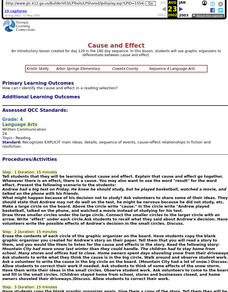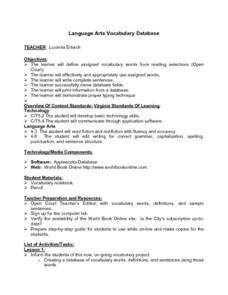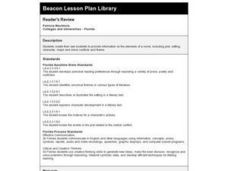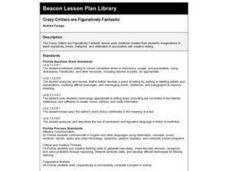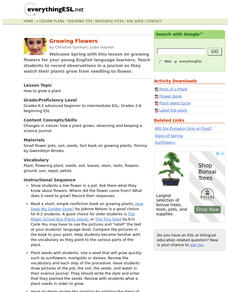Curated OER
Cause and Effect
Fourth graders use graphic organizers to differentiate between cause and effect. They read a story independently and write the cause and effects in the graphic organizer.
Curated OER
When Worlds Collide
High schoolers research on a focused topic. They gather information from a range of sources and orally cit it in a presentation. Students connect information acquired in previous lessons with research on the assigned topic. They research...
Curated OER
Language Arts Vocabulary Database
Students read a selection and identify the vocabulary words for the current week. Individually, they use the words to write in complete sentences and put the words into a database. They also practice their typing skills and must keep...
Curated OER
Fun with Balloons
Fifth graders design their own hot air balloon. In this science lesson, 5th graders investigate how factors like weight and sizes affect a balloon's lifting power. They also write math problems based on facts written in the book "The...
Curated OER
Travel Brochures
Third graders divide into teams and select a country to research. They read and review "Notetaking Skills" and begin their research. Next, they work together and share the information they have located. Each team fills in a template with...
Curated OER
Library Lesson Plan
Explain the differences between fiction and non-fiction and the characteristics of a biography. Learners analyze three pieces of literature on the same topic to determine which is fiction and which is non-fiction. In the end, relate the...
Curated OER
Weather Proverbs
Define and write proverbs! Learners define proverbs, use the Internet to find weather-related proverbs, and talk with their parents to learn other proverbs. There's a well-structured worksheet included here.
Curated OER
Self-Monitoring Strategies and Vocabulary Games
Middle and high schoolers identify how to discover a word's meaning by exploring context clues and any pictures, diagrams, photographs, and charts that might be included. They continue this process with other examples and locate one on...
Curated OER
The Seven Continents Scavenger Hunt
Who doesn't enjoy an engaging scavenger hunt? Here, scholars listen to, and discuss, the informative text, Where is my Continent? by Robin Nelson. They then explore the seven continents and four major oceans using Google Earth.
Curated OER
Where Do We Begin?
Primary learners grasp sequence of events by discussing morning routines and reviewing the story of Little Red Riding Hood. They explore the necessity of correct order of events. As a class, create a story with a beginning, middle, and...
Curated OER
Spider Watching
Spiders are creepy, crawly - and interesting! Young entomologists learn about parts of a spider's body, their habitats, ways spiders catch their prey, and what they most like to eat. Some excellent art activities are included in the plan...
Curated OER
From Seeds to Plants
Second graders review the process of plant reproduction and the role of seeds in that process. The students dissect a seed, analyze their finds, collect and record data, and make predictions about seed germination and plant growth.
Curated OER
Wild Animal Investigation - Habitat Diorama
Students research wild animals in cooperative groups and use their information to construct habitat dioramas. They demonstrate competence in using different information sources, including those of a technical nature, to accomplish...
Curated OER
Library Curriculum: What Would a Wonderful Library Be Like?
Second graders complete a KWL chart about libraries. They create a book using writing patterns of a particular author. Students decide criteria for awarding the Second Grade Librarian Award to books in the classroom library, and use a...
Curated OER
Soaring High with Kites
Learners make kites from patterns. They write haiku poetry. They listen to stories about kite festivals in different countries.
Curated OER
Check Comprehension & Apply Writing
Pupils check their comprehension skills and apply what they've learned to their own writing. They write two or three sentences that tell what happened to make the Learning Tower of Pisa dangerous and describe what was done to make the...
Curated OER
How-To Books
Students apply their knowledge and create a how-to book of their own. In this early childhood language arts worksheet, students learn about non-fiction books and write their own procedural non-fiction booklets.
Curated OER
Reader's Review
Students create booklets to provide information on elements of a novel, including plot, setting, character, major and minor conflicts and theme.
Curated OER
Crazy Critters are Figuratively Fantastic
Eighth graders use creatures created from their imaginations to practice hyperbole, simile, metaphor, and alliteration in association with creative writing. They utilize a worksheet imbedded in this plan to guide their writing.
Curated OER
Breaking Barriers with Melba Pattillo
Students are introduced to individuals who made the civil rights movement a success. They examine, analyze and interpret the events and people who had a significant and stirring impact on the course of history through stories, interviews...
Curated OER
The Human Jigsaw
Fourth graders, using Thomas Paine's "The Crisis, No. 1" from The American Crisis, form a human jigsaw.
Curated OER
Growing Flowers
Students grow flowers from seeds. They plant quick-growing seeds in a flower pot and consider what a seed needs to grow. They observe and record the growth of the planted seeds in science journals.
Curated OER
How Logical is Garfield?
Third graders analyze comics found in the newspaper for samples of logical, emotional, and ethical appeal. They write a paragraph for each selected comic strip explaining how the comic strip represents the use of logic, emotions, or ethics.


